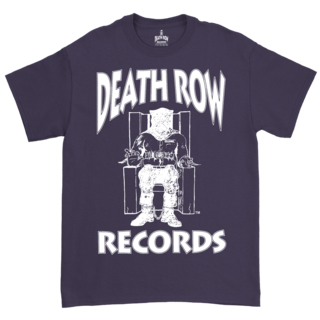Death Row Records was probably the most influential and controversial record labels in hip-hop history. Founded noisy . 1990s, the label became synonymous with the West Coast rap movement and was the place to find some with the most legendary artists inside genre. With groundbreaking albums, notorious feuds, as well as a meteoric fall and rise, death row records t shirt remains a pivotal chapter in music history.
Founding and Rise to Power
Death Row Records was founded in 1991 by Suge Knight and Dr. Dre, following Dre’s departure from N.W.A and Ruthless Records. The label is made as a vehicle for Dre’s solo career and quickly became a magnet for West Coast talent.

Dr. Dre’s debut album, The Chronic (1992), was a commercial and critical success. It introduced the entire world to G-Funk, a smooth, synth-heavy kind of hip-hop that defined the era.
The Chronic also introduced Snoop Doggy Dogg (now Snoop Dogg), who became a breakout star along with his debut album, Doggystyle (1993), also released under Death Row.
With these early successes, Death Row established itself as a dominant force in hip-hop.
The Golden Era
Between 1992 and 1996, Death Row was at its peak. The label signed top-tier talent, including:
Tupac Shakur (2Pac): Joined the label in 1995 after Suge Knight posted his bail. His album All Eyez on Me (1996) became the first double album in hip-hop to look multi-platinum.
Tha Dogg Pound (Daz Dillinger and Kurupt), Nate Dogg, and Michel'le also released music from the label.
Death Row became recognized for its aggressive business tactics, opulent lifestyle, and violent reputation—often mirroring the tough realities in the streets that this music depicted.
Controversy and Decline
The label's success was overshadowed by internal conflict, legal trouble, and violence:
The notorious East Coast–West Coast feud reached its peak during this time, with Death Row and Suge Knight at odds with artists from New York, especially The Notorious B.I.G. and Bad Boy Records.
In September 1996, Tupac Shakur was fatally shot in Las Vegas, a murder still officially unsolved.
Just months later, in early 1997, Suge Knight was imprisoned on parole violations.
Without strong leadership, artists did start to leave. Dr. Dre left in 1996 to form Aftermath Entertainment, citing the label's increasingly toxic environment.
By earlier 2000s, Death Row had lost its momentum. In 2006, the label filed for bankruptcy.
Rebirth and Legacy
Despite its downfall, the legacy of Death Row Records remains:
Its music shaped the sound of 1990s hip-hop, particularly the dominance of West Coast rap.
The label helped launch and elevate the careers of Dr. Dre, Snoop Dogg, Tupac, among others.
In 2022, Snoop Dogg acquired the rights to Death Row Records, signaling a revival and a desire to reimagine its future inside digital age, including ventures into NFT music and streaming platforms.
Death Row Records is a bit more than a record label—it’s synonymous with hip-hop’s raw power, being able to capture life’s harshest truths, and it is enduring cultural impact. While its story is filled with drama, violence, and controversy, the music activity it produced changed the genre forever and remains influential to this day.
